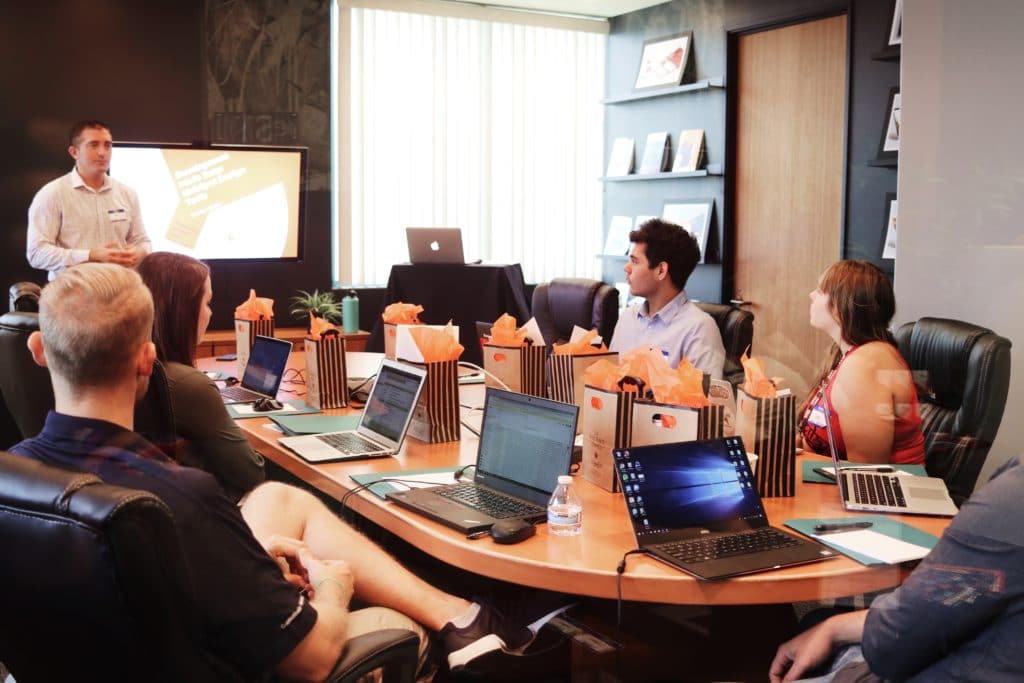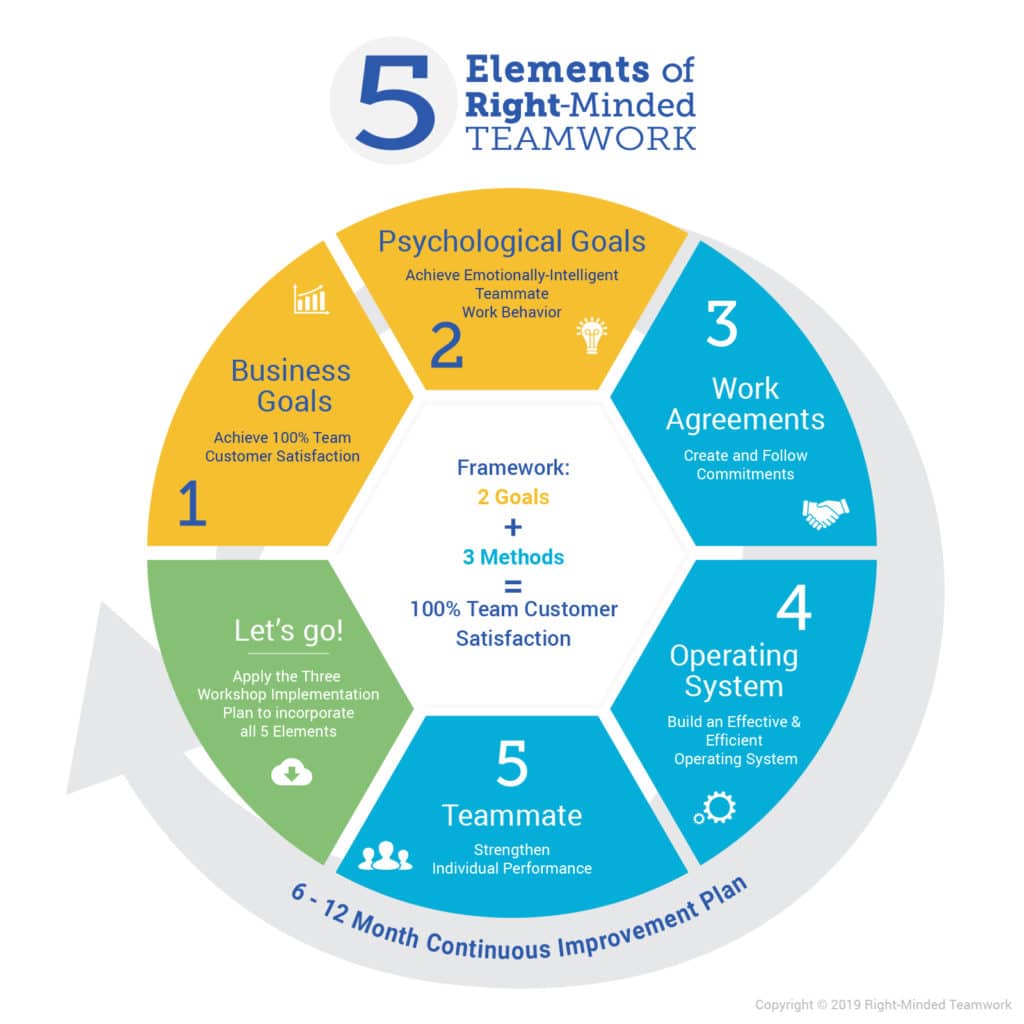The Role of a Team Facilitator
As a facilitator, it’s your job to ensure team members’ concerns are aired and problems are resolved. Whether you’re a professional facilitator or have found yourself in the facilitator role because you’re a team leader, becoming an effective team building facilitator and leading your team to success is a big goal with many potential obstacles.
What do you do when you’ve got an exceptionally diverse group of people, and the team struggles with trust?
How do you lay ground rules when communication styles conflict?
What will you do if no one on the team seems interested in problem-solving?
How do you help group members stay focused, accept their responsibilities, communicate clearly, and hold themselves and each other accountable?
It’s a lot to accomplish.

Becoming an Effective Team Building Facilitator
The best facilitators know true team building doesn’t begin with “fun” ice breakers. They know playing games or putting teams through a high ropes course isn’t the secret to shifting group dynamics.
Real progress takes real work. Unifying a team requires effective facilitation skills. The good news is, whether you’re working with a large group or a small group, you’ve come to the right place. You have what it takes.
You have Right-Minded Teamwork on your side.

“I wish I had brought in [RMT] six months earlier because not only are our meetings much better, we’re making much better team decisions.”
~Art H., Manager, Geophysical Service Team, Chevron Exploration & Production

Do no harm.
Work as one.
Develop people and teams that work.
Right-Minded Teamwork is effective for professional facilitators and groups of all sizes
Right-Minded Teamwork (RMT) is a unique, proprietary group process to team building, developed by consultant and Certified Master Facilitator Dan Hogan over the course of his 30-year career.
RMT focuses on real-world results, including acceptance, forgiveness, and self-adjustment among teammates. Instead of leading teams through meaningless games and unproductive team exercises, RMT facilitators create powerful, lasting change by focusing on cause and effect – the impact of one team member’s thought patterns on the behavior of other team members.
No matter the size of the team, diving deep into business goals and psychological differences allows teams to work through real issues to discover and dissect the root causes of challenges. With RMT, cohesion, unity, and improved team performance are the inevitable end result.
Helping your team achieve success, you have indeed become an effective team building facilitator.
Is Right-Minded Teamwork right for you?
You may have tried other facilitation techniques with poor results. You may even feel your confidence slipping because of it. But there’s good news: the RMT way is different.
Unlike ropes courses, team games, and even personality-type assessment indicators, RMT isn’t just another “team bonding” approach to team building. It’s about teammate-to-teammate coaching, mentoring, and support.
The RMT method is a non-confrontational, continuous improvement process for small groups, large groups, and teams of all sizes. It directly addresses and resolves the root cause of even the most difficult teamwork situations.

If you want to design powerful and effective team building workshops, lead groups with 100% confidence, and facilitate even the most difficult team members and situations, RMT is for you.
Our powerful products and tools are available virtually to facilitators across the United States and beyond.
How does Right-Minded Teamwork actually work?
Five essential elements make up the method’s framework. These five elements, which can also be used by team leaders, are incorporated into a unique, 12-step team building workshop process specifically for facilitators.
Right-Minded Teamwork’s Five Essential Elements:
- Business Goals
- Psychological Goals
- Solution = Work AgreementsA Work Agreement is a collective teammate promise to transform non-productive, adversarial behavior into collaborative teamwork behavior. More
- Method = Team Operating SystemsRMT’s Team Operating System is a six-step, 90-day, continuous improvement system that organizes team functions to increase the likelihood of achieving customer satisfaction. More
- Solution = Right-Minded Teammates
Right-Minded Teamwork helps facilitators solve problems and implement a unified group process.
The first two components of RMT are goal oriented. Specifically, facilitators work with team leaders to identify business goals and psychological goalsA team’s psychological goals describe how teammates intentionally choose to think and behave as they work together to achieve their team’s business goals. More.
For example, if a company wants to achieve the common but lofty goal of 100% customer satisfactionCreating 100% customer satisfaction is a primary goal of Right-Minded Teamwork. More, the RMT process first works to ensure each teammate understands what customer satisfaction looks like. This baseline serves as a shared goal for team member improvement. Group members can then work together to create and sustain productive, effective group processes focused on achieving total customer satisfaction.
Once goals are clearly defined, the RMT process offers three proprietary methods for strengthening group dynamics. These processes involve creating Work Agreements, strengthening your Team Operating System, and developing Right-Minded Teammates.

Work Agreements are a way of obtaining buy-in from team members by affirming their connection and commitment to a particular goal, objective, project, or process. They define how team members work, perform, and behave together and can be used to solve just about any teamwork issue.
The Team Operating System is the framework that outlines how the team runs. It organizes a company or team’s processes and procedures to match the goal of 100% customer satisfaction.
The final solution, the Right-Minded Teammate, revolves around strengthening the performance of individual team members. Rather than critiquing or punishing poor performance, RMT considers a team to be only as strong as its weakest link or poorest performer. Right-Minded Teammates are engaged in their team; teammates band together to strengthen individual and group performance.
Curious about how to use RMT to improve your team?
Our 12-step team building workshop model walks team facilitators through the RMT process to solve just about any team issue… even the challenges team leader Tom R. was facing on his team.
With the right facilitation tools, good facilitation can produce great results.
Tom R. was the Manager of Field Operations for Chevron in the Gulf of Mexico, responsible for supporting all the company’s offshore oil platforms. Tom was good at his job. But one of his teams was struggling.
Though they were competent, they weren’t happy, and they were far from productive. Worst of all, two-thirds of the team members were arrogant and overly aggressive.
Tom didn’t know what to do, but in the past, he’d gotten help from Dan Hogan, Chevron’s long-standing external team building facilitator. So, he called Dan again. After identifying business goals and psychological goals, Dan guided the team to create two work agreements: a behavioral agreement to improve trust, and a process agreement to become a self-managing team.
Just one year later, the team had completely turned around. They had recommitted to their shared goals and were honoring their work agreements. As a result, they experienced:
- 78% increase in teammate trust
- 46% increase in mutual team member support
- 61% increase in complying with decisions
- Over $350,000 in savings.
Most importantly, they were happy and productive, which also meant their leaders and the team’s customers were happy. The team continued to improve and work together for another five years, never returning to their old, dysfunctional ways.
Read their story here in How to Create Team Working Agreements That Bring People Together.
When a team embraces the five elements of RMT’s team development method, and facilitators apply RMT’s 12-step process for designing workshops, true growth and progress can occur.
Are you ready to become an effective team building facilitator?
Still not sure whether Right-Minded Teamwork and the 12-step workshop design process is right for your team?
